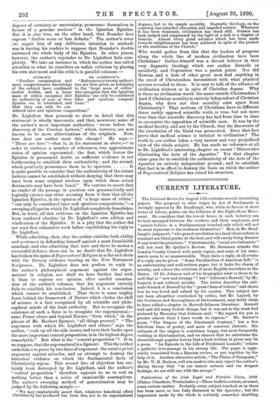CURRENT LITERATURE.
The Universal Review for August 15th contains several interesting papers. The proposal to alter wages by Act of Parliament is strongly opposed by Mr. Bradlaugh, who, while in favour of short hours of labour, points out the fallacies of the Eight-Hour Move- ment. He considers that the lowest hours in each industry can be best arranged between the workers and their employers, and "cannot believe in a Parliamentary ironclad rule which will not be most injurious to the workmen themselves." Men, in Mr. Brad- laugh's judgment, "who preach revolution ins land where reform is constant are blind guides at the best, and will surely bring disaster if any trust the preachers." Unfortunately, "social revolutionists" will not read Mr. Qthlter's Review. Mr. Baumann attacks the London County Council with much vigour, and some of his state- ments seem to us unanswerable. They claim a reply, at all events if a reply can be given. "Some Peculiarities of American Life" is an entertaining and well-written paper, but it lacks the charm of novelty, and echoes the criticism of most English travellers in the States. Of Dr. Johnson and of his biographer what is there to be said that is "new and strange " ? but "Johnson's Boswell," by Mr. Layard, is not without novelty. The writer describes the esti- mate formed of Boswell by the "great Cham of letters," and shows how he was loved and valued by his master. This subject has not been altogether overlooked by critics, but Mr. Layard, by the freshness and thoroughness of his treatment, may fairly claim, to have added a chapter to Boswell-Johnson literature. Boswell said and did many foolish things, but it was not to the weak fool pictured by Macaulay that Johnson said : "My regard for you is greater almost than I have words to express." Mr. Barlow's poem, "The Singers of the Nineteenth Century," has a few felicitous lines of poetry, and more of sonorous rhetoric. His estimate of the singers is sometimes happy, but more frequently wanting in discrimination, and we observe that he entertains the absurd though popular heresy that a book written in prose may be a poem. "An Episode in the Life of Ferdinand Leanne," relates a pathetic love-passage in his stormy life. The paper is appa- rently translated from a Russian review, or put together by the help of it. Another attractive article, "The Plains of Patagonia," by Mr. W. H. Hudson, will win readers who may reject the author's daring theory that "in our inmost natures and our deepest feelings, we are still one with the savage."


































 Previous page
Previous page